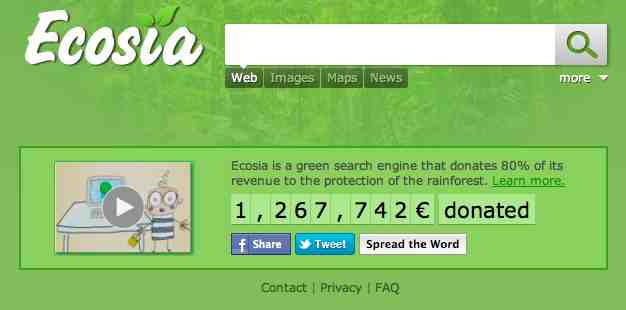
The big guns of the tech world have the financial weight to reinvest in new services, but can startups give them a run for their soul?
I have not tested it yet, but there is a new, alternative search engine worthy of checking out. Click the image above to go to the Guardian story about would-be giant-killing do-gooders (or is it giant-killing would-be do-gooders?):
A new breed of internet startup is taking on the big guns of the tech world. Seeking to capitalise on consumer disillusionment with the established order in the wake of headlines about tax-dodging, personal data profiteering and poor factory conditions, these startups represent the radical face of the internet.
Unusually for a tech company, however, it is not technological innovation that gives them their unique selling point. Rather it is the promise to do social and environmental good.
“They started with decent values – Google and Apple,” says Christian Kroll, founder of Ecosia, an eco-conscious search engine based in Berlin. “They wanted to build something that improves the world. But as soon as you become a public company, shareholders exert influence.”
Google’s motto, “Don’t be evil”, is in many respects pioneering for a corporate. But Kroll takes issue with this negative imperative. “If Google had the slogan ‘Be good’ then maybe they would do things differently.”
Ecosia is hoping to win the hearts of environmentally conscious web users where others have failed (anyone remember Treehoo, Ecosearch or Blackle?). The site was launched in 2009 and now receives about 15m searches a month.
Essentially a skin for a system powered by Bing and Yahoo, Ecosia donates 80% of advertising revenues toward environmental protection: specifically, a rainforest protection programme run by WWF. To date it has raised more than £1m.
It’s all very well luring away eco-conscious consumers and contrarians keen to swim against the tide; the litmus test, however, comes in trying to persuade other users to ditch the sites they know and trust. To his credit, Kroll seems keenly aware of this. “If you just have good intentions but don’t deliver a product, then you are going to fail.”
Jo Edwardes, founder of Good Connection, a new social network that partners with charities and focuses on health and well-being, believes his product competes in its own right with the likes of Facebook and Google+.
The business donates “up to 20%” of advertising revenues to charity, and privacy controls are one of his big pitch points. Users are given multiple profiles for friends, family and professional life – clearly an attempt to attract users frustrated with the frequently altering privacy policies of other social networks.
Good Connection is still in beta and Edwardes won’t provide statistics on its current users, but the site has a newsletter in development which he says will go out to half a million individuals. “Users are always going to be open to new ideas and concepts. It’s so easy to see who’s behind a new concept, that they can fairly quickly deduce if a startup is coming from a good place or not.”
Is he concerned that ethical startups like his could one day become victims of their own success? “It’s very difficult to reverse engineer,” he asserts, but adds that this would not be so bad. “If something like Good Connection stimulated Google or Facebook to change its model to become a totally ethical social enterprise, then frankly that would be a good thing.”
For the time being at least, the big guns of the tech world have the edge owing to the financial weight they wield and can reinvest in new services. “There is always going to be a cash advantage … That is the reality,” Edwardes admits, though he insists that the internet is still an important leveller.
“We certainly have a niche space and certain audience to appeal to. Is that audience big enough to appeal to the big guys? I’m not so sure that’s the case just yet.”
Read the rest of the story here.